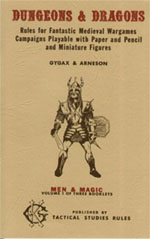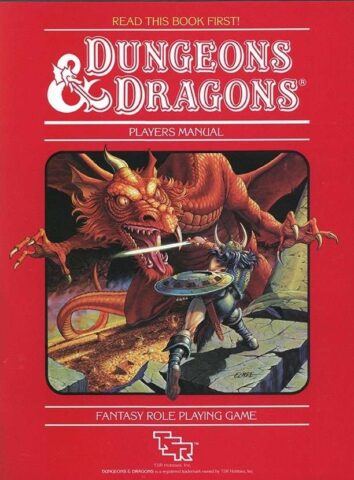November 18, 2020

Tonight, I’ll be running the first session of my next long form game – an OD&D open table.
The concept of an open game table has been something tumbling around my head for several months now. As someone relatively new to the hobby, an open table offers the unique ability to exponentially increase the number of players in my circle. There’s also the benefit of playing whenever desire strikes me, with little to no hassle of getting a group together. This has obvious appeal for any GM who has had the pleasure of rescheduling sessions to get everyone to the table.
This style of play hasn’t been the standard for quite some time, but back in the early days of the hobby, it was really the go-to way to play. As such, it seemed more than fitting to run an old-school table with THE old-school game.
For the record, I’ve never run any edition of D&D before. I’ve played some 5e, and read through the rulebooks for 3e, but this is my first attempt at tackling the game in any form. Therefore, I’ve had to overcome a pretty serious learning curve. In addition to the (well-documented) complexities of the OD&D rulebooks, I’ve had no primer for what D&D should feel like. I didn’t understand Armor Class, or what a Saving Throw meant. Aside from the obvious examples, I’m not familiar with the creatures that inhabit fantasy realms. I had to learn what Vancian magic is. I can’t use my existing knowledge of the game and apply it to the original edition. Because I don’t have existing knowledge.
Thankfully, I’m not going in totally blind. There’s a VERY dedicated and vocal following for OD&D and its various retro-clones. Many are lifelong gamers and have an astounding knowledge of the rules, history, and general approaches to the game. I’ve found a plethora of information on many of these gamer’s blogs. It’s no secret that the original D&D game is one of interpretation, and I think that discussing the various versions that exist is as valuable as the history itself.

I’m going to be writing this series of essays on my experiences with both OD&D and the open table format. Some of these will be musings on the rules and the vast variations on them. Others will be more focused on the history and terminology. In addition, I’ll also include the occasional session recap or delve into session prep between games. Expect some discussion of old modules for both Classic and Advanced D&D, like Keep on the Borderlands and Tomb of Horrors.
This will be my first series on specific gameplay, and I’m excited to see how this all turns out. There’s obviously a trove of information on the subject, and it will be interesting to watch as I become more acquainted with the rules, genre, and feel for the old-school style.
In terms of the ruleset being used, it’s a bit of a mash-up. I’ll primarily be using the White Box (that’s the original edition without any supplements). But I’m also including some supplemental rules, like the Thief Class from Greyhawk. I’ve also got a copy of the ’83 Mentzer Basic Set, which has some clear differences from the original edition. This is mostly for on-the-spot clarifications for when (not if) I get totally lost.
For those who are curious, I’ll be running mostly homebrewed scenarios in a non-specific D&D setting. One of my players asked me what setting the game was in, and I laughed and said I don’t know enough of the lore of D&D realms to say for sure, much to my friend’s dismay. (Sorry Steven.)
